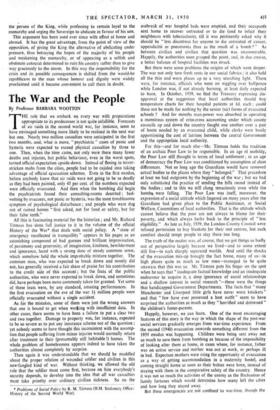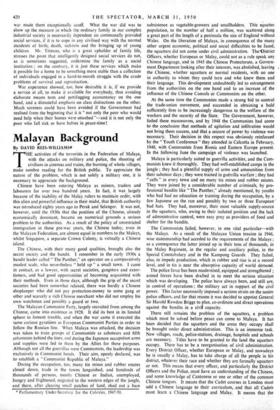The War and the People
By Professor BARBARA WOOTTON
THE rule that we embark on every war with preparations appropriate to its predecessor is not quite infallible. Forecasts of air raids in the second world war, for instance, seem to have envisaged something more likely to be realised in the next war but one. Nearly two million casualties were anticipated in the first two months, and, what is more, " psychiatric " cases of panic and hysteria were expected to exceed physical casualties by three to one. Then, when the time came, not only were there many fewer deaths and injuries, but public behaviour, even in the worst spots, turned official expectation upside-down. Instead of fleeing in terror- stricken mobs from the cities, people had to be cajoled into taking advantage of official evacuation schemes. Even in the first exodus, before anybody knew that air raids were not going to be as deadly as they had been painted, only 45 per cent. of the numbers expected were officially evacuated. And then when the bombing did begin the psychiatrists found their consulting-rooms deserted ; bed- wetting by evacuees, not panic or hysteria, was the most troublesome symptom of psychological disturbance ; and people who were dug out of ruined homes " first asked, not for food or safety, but for their false teeth."
All this is fascinating material for the historian ; and Mr. Richard Titmuss has -done full justice to it in the volume of the official History of the War* that deals with social policy. A " state of emergency recollected in tranquillity " appears in his pages as an astonishing compound of bad guesses and brilliant improvisation, of parsimony and generosity, of imagination, kindness, bewilderment and ignorance, laced with a strong dose of steady common sense, which somehow held the whole improbable mixture together. The common man, who was expected to break down and mostly did not, has generally received a fair share of praise for his contribution to the credit side of this account ; but the feats of the public authorities, who were never expected to break down, and sometimes did, have perhaps been more commonly taken for granted. Yet some of those feats were, by any standard, amazing performances. In the first evacuation on the eve of the war 1-1 million people were officially evacuated without a single accident.
As for the mistakes, some of them were just the wrong answers that one is bound to get when woiting with insufficient data. In other cases, there seems to have been a failure to put a clear two and two together. Damage to property was, for instance, expected to be so severe as to put any insurance scheme out of the question ; yet nobody seems to have thought this inconsistent with the assump- tion that people suffering from minor injuries would normally return after treatment to their (presumably still habitable 1) homes. The whole problem of homelessness appears indeed to have taken the authorities almost completely by surprise.
Then again it was understandable that we should be muddled about the proper relation of wounded soldier and civilian in this new-fangled kind of war. Without thinking, we allowed the old rule that the soldier must come first, because on' him everybody's security depends, to develop into the idea that all war casualties must take primity over ordinary civilian sickness. So on the
Problems of Social Policy by R. M. Titmuss (H.M. Stationery Office: History of the Second World War).
outbreak of war hospital beds were emptied, and their occupants sent home to recover untreated or to die (and to infect their neighbours with tuberculosis), till it was pertinently asked why it should be " less disastrous for anyone to die untreated of cancer, appendicitis or pneumonia than as the result of a bomb ? " As between civilian and civilian that question was unanswerable. Happily, the authorities soon grasped the point, and, in due course, a better balance of hospital facilities was struck.
But there were some problems the origins of which went deeper. The war not only tore fresh rents in our social fabrics ; it also held all the thin and worn places up to a very searching light. There were, for instance, officials who went on niggling over halfpence while London was, if not already burning, at least daily expected to burn. In October, 1939, we find the Treasury expressing dis- approval at the suggestion that local authorities should buy temperature charts for their hospital patients at Id. each ; could these not be made for nothing by the senior (sic) forms of evacuated schools ? And for months man-power was absorbed in operating a monstrous system of criss-cross accounting under which county councils up and down the country fought one another over a pair of boots needed by an evacuated child, while clerks were busily apportioning the cost of latrines between the central Government and the appropriate local authority.
For this—and for much else—Mr. Titmuss holds the tradition of an archaic Poor Law to be responsible. In an age of mobility, the Poor Law still thought in terms of local settlement ; in an age of democracy the Poor Law was conditioned by assumption of class differences. Not so long ago the Guardians would have removed actual bodies to the places where they " belonged." That procedure at least we had outgrown by the beginning of the war ; but we had only substituted the practice of sending the bills round instead of the bodies ; and to this we still clung tenaciously even while the bombe were falling. The Poor Law was itself, moreover, the expression of a social attitude which lingered on many years after the Guardians had given place to the Public Assistance, or Social Welfare, Committees of local authorities. That is the attitude which cannot believe that the poor are not always to blame for their poverty, and which always harks back to the principle of " less eligibility." As late as July, 1939, the London County Council were refused permission to buy blankets for their rest centres, lest such comfort should tempt people to stay there too long.
The truth of the matter was, of course, that we got things so badly out of perspective largely because we lived—and to some extent still live—in such sharply separated worlds. And until the shocks of the evacuation mix-up brought the fact home, many of us—in high places quite as much as low ones—managed to be quite unaware that this was so. Mr. Titmuss puts his finger on the spot when he says that "inadequate factual knowledge and an inadequate endeavour to acquire it, a deep ignorance of social relationships and a shallow interest in social research "—these were the things that handicapped Government Departments. The facts that " many Manchester and Liverpool little girls have never worn knickers " and that " few have ever possessed a best outfit " seem to have surprised the authorities as much as they " horrified and distressed " the children's foster-parents.
Happily, however, we can learn. One of the most encouraging features of this story is the way in which the shape of the post-war social services gradually emerges from war-time experience. From the second (1940) evacuation onwards something different from the 1939 exodus was happening. Children were being sent away not so much to save them from bombing as because of the impossibility of looking after them at home, in cases where, for instance, father was on active service and mother was out at work, or perhaps ill in bed. Expectant mothers were using the opportunity of evacuation as a way of getting accommodation in a maternity hostel, and coming straight home as soon as their babies were born, instead of staying with them in the comparative safety of the country. Hence it was not so much the activities of the enemy as the fluctuation of family fortunes which would determine how many left the cities and how long they stayed away.
But these emergencies are not confined to war-time, though the
war made them exceptionally acute. What the war did was to show up the measure in which the ordinary family in our complex industrial society is necessarily dependent on communally provided social services, if it is to cope in any civilised way with the normal incidents of birth, death, sickness and the bringing up of young children. Mr. Titmuss, who is a great upholder of family life, stresses the point that intelligently designed social services do not, as is sometimes suggested, undermine the family as a social institution ; on the contrary, it is just these services which make it possible for a home to be something more stable than a collection of individuals engaged in a hand-to-mouth struggle with the crude problems of survival and reproduction.
War experience showed, too, how desirable it is, if we provide a service at all, to make it available for everybody, thus avoiding elaborate means tests and pettifogging accountancy on the one hand, and a distasteful emphasis on class distinctions on the other. Much soreness could have been avoided if the Government had realised from the beginning that it is " not only the poor who would need help when their homes were smashed "—and it is not only the poor who fall sick or have babies in peace-time!







































 Previous page
Previous page